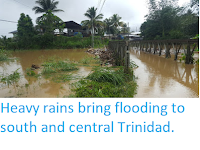Many areas of south and central Trinidad are suffering from flooding, after days of heavy rain caused several rivers in the area to burst their banks. The rivers were already swollen due to a repeated rain storms since the beginning of October 2018, with this weeks rain finally causing the banks to fail. There are no reports of any Human casualties at this time, but many people have reported losing livestock, and there are concerns that communities will soon run out of food and drinking water, or that water-born diseases will become established in the area.
Floodwaters in the town of Debe in southwest Trinidad on Saturday 17 November 2018. Ansel Jebodh/NewsDay.
Like other parts of the Caribbean, Trinidad often suffers of
flooding events in the summer, associated with the areas frequent hurricanes. However this weeks flooding is not associated with
any hurricane, but rather appears to have been caused by the movement of
the Inter-Tropical Convergence System, a permanent low pressure system
that circles the globe approximately on the equator. This system is caused by heat from the Sun, which is greater at the
equator then elsewhere, causing air over the equator to rise, and
drawing in air currents from the Northern and Southern Hemispheres,
forming the trade winds. This updraughts pull up water vapour from the
sea surface high into the atmosphere, where it eventually precipitates
out of the cooler, less dense atmosphere, falling back as rain.
Flooding in Penal, also in southwest Trinidad, this week. Trinidad Express.
Importantly, while the actual equator is fixed, the tilt of the Earth
relative to the Sun means that the point at which the Sun is directly
overhead moves northward in the northern summer and south in the
southern summer, creating a thermal equator, which the Inter-Tropical
Convergence System follows, moving north in the north and south with the
seasons (and since the sea heats and cools more slowly than the land,
this movement is more pronounced over land than sea). The upshot of this
is a system of storms which circulates on the equator at the equinoxes,
but which moves north and south to the tropics around the solstices. Furthermore
this system moves further away from the equator in warmer years, and is
predicted as being likely to do so more with global warming. It is
this Inter-Tropical Convergence System passes over Trinidad at this time of year, causing storms and flooding over the island. Worryingly, flood events at this time of year are becoming increasingly common, as global warming leads to higher sea temperatures, and therefore more evaporation in the Caribbean Sea.
The approximate position of the Inter-Tropical Convergence System in July and January. Mats Halldin/Phys.org.
See also...
Follow Sciency Thoughts on Facebook.







